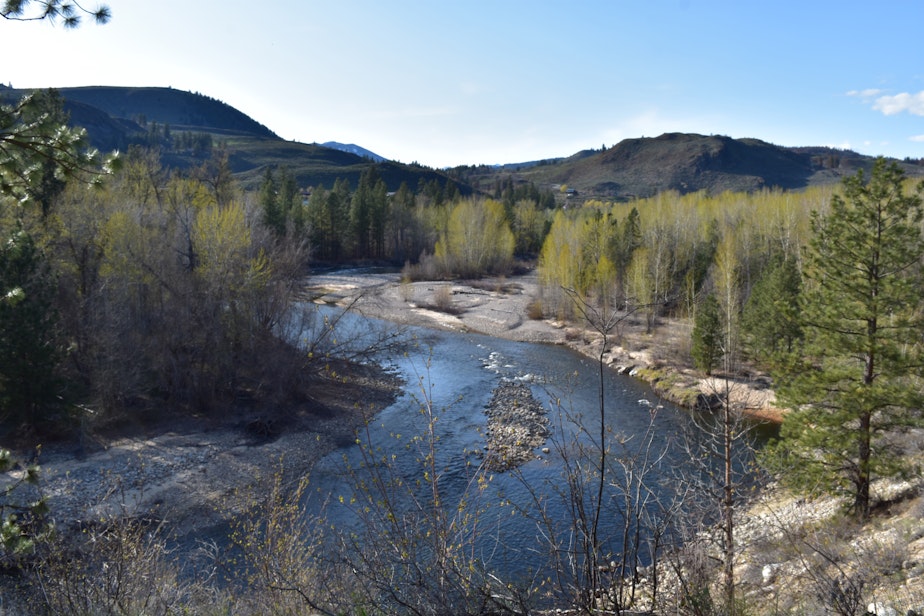'It's bringing healing:' Methow Valley land returned to Colville Tribes

More than a century after the United States government took most of their land, the Confederated Tribes of the Colville Reservation are getting small chunks of it back.
The nonprofit Methow Conservancy handed over the deed to 328 acres of forest, sagebrush, and salmon spawning grounds along the Chewuch River in the Methow Valley to the Colville Tribes on May 19.
The deal follows the return of 9,200 acres of ranch land just east of the Methow Valley to the Colville Tribes in October.
“It touches our heart," said Andy Joseph Jr., Colville Business Council Chairman, "that some of our people will be able to spend some time in their homeland on probably the very same place their elders’ footsteps once were.”
The business council is the governing body of the Confederated Colville Tribes.
Long before the Methow Valley became a cross-country skiing mecca and Seattle’s vacation playground, it was home to the Methow Tribe.
Sponsored
The Methow are one of 12 tribes forced onto the Colville Reservation near the state’s northeast corner, along with the Chelan, Chief Joseph Band of Nez Perce, Colville, Entiat, Lakes, Moses-Columbia, Nespelem, Okanogan, Palus, Sanpoil, and Wenatchi Indians.
With a 1.4 million acre reservation, Washington’s biggest, the Confederated Colville Tribes are one of the state’s biggest landowners.
The 12 tribes used to have much more land, with traditional territories stretching from the north Cascades to the Idaho border.
Then the U.S. government forced them onto reservations and took much of that land away.
An 11-million-acre Moses-Columbia Reservation briefly encompassed all of the Methow Valley. The U.S. government returned the reservation to the public domain in 1883, just four years after establishing it, according to Colville tribal historians.
Sponsored
The Colville Reservation today is less than half the size it was when it was created in 1872. An act of Congress in 1892 eliminated what is now called “the north half” from the reservation.
Five years ago, the tribal government approached the Methow Conservancy about acquiring the Wagner Ranch along the Chewuch River. The ranch has a mile and a half of undeveloped riverfront with spawning grounds for Chinook salmon and steelhead.
“The property that we're getting also was the former Moses-Columbia reservation, and that was taken away from us as well,” Joseph said.
He said his own ancestry includes Methow, Okanagan, and Arrow Lakes on his dad’s side and Palus, Moses-Columbia, Wenatchee, and Entiat on his mom’s side.
“Our people used to be able to spear the salmon that used to be in that area and get enough to live off of the whole year to feed their families,” Joseph said.
Sponsored
Before the Methow Conservancy could act, a Portland-based conservation group, the Western Rivers Conservancy, bought the property. The Portland group's goal was to sell the land to the Yakama Nation, which is working far upriver from its own territory in south-central Washington to restore spawning habitat for salmon that swim up the Columbia River.
That deal fell through, and the rivers group put the ranch on the market again, giving the Colville Tribes and the Methow Conservancy a second chance to save the ranch from being turned into vacation homes.
“The main thing is it’s bringing back healing,” Joseph said of the newly acquired land. “One of the best feelings that you can receive in your heart, that will stay with us forever, [is] that we got something like this back.”
Joseph said the Colville Tribes intend to manage the area for fish and wildlife, and for traditional practices like gathering edible plants including bitterroot, camas, and serviceberries.
In October, the Seattle nonprofit Conservation Northwest returned another 9,200 acres of sagebrush country northeast of Omak, just east of the Methow Valley, to the Colville Tribes.
Sponsored
According to Conservation Northwest, the former Figlenski family cattle ranch provides habitat for species like grouse and badgers, as well as a key corridor that allows carnivores like lynx and wolverines to migrate between the North Cascades, the Kettle Range of northeastern Washington, and the Rocky Mountains beyond.
“We're hoping that there'll be more to follow,” said Joseph, whose Native name, Yǝx̌yǝx̌útxn, means “badger.”
Conservation Northwest executive director Mitch Friedman said in a press release that the Figlenski ranch deal may be the most rewarding and meaningful action he’s been involved in.
“We are making a statement here that injustices can be redressed,” Friedman said.
The Conservation Northwest deal prohibits residential, industrial, or commercial use of the land other than agriculture or minimal commercial recreation.
Sponsored
Methow Conservancy executive director Sarah Brooks said her group donated the Wagner Ranch land to the Colville Tribes outright, with no strings attached.
“It was clear we shared the same vision and values for the landscape. And out of respect for the care they gave that land since time immemorial, we felt it was the right thing to do to give it back with a sense of trust,” Brooks said.




